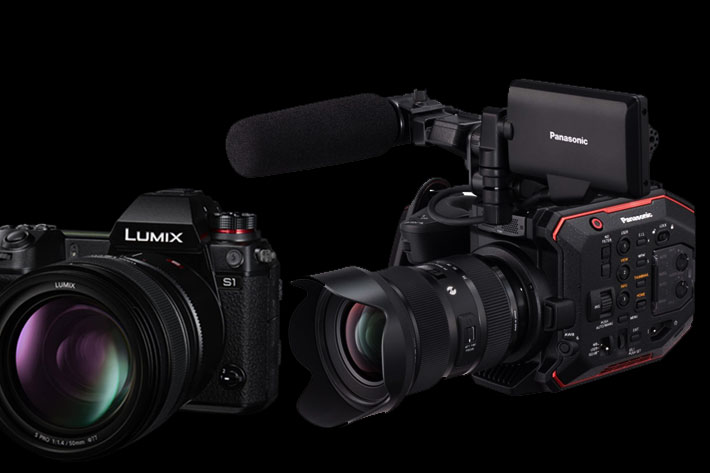
Panasonic has not disclosed the price yet, but next July the Panasonic S1 mirrorless camera will get V-Log like the EVA1, along with other requested features, like 4:2:2 10-bit 4K 60p HDMI output.
Since the announcement of the LUMIX S1 full-frame mirrorless camera that Panasonic made it clear that a paid upgrade would be available for those interested into getting more video features than those already present in this model. The S1, which is the more video-centric of the two cameras introduced – LUMIX S1 and S1R – already has an impressive list of specifications, but the paid upgrade will move it to a whole new level.
Right now, the LUMIX S1 comes with a 24.2-megapixel full-frame CMOS sensor (35.6mm x 23.8mm) that provides, according to Panasonic, “a wide dynamic range and excellent performance at high sensitivity in addition to a natural yet sharp image description thanks to sufficient light condensation per pixel”. The LUMIX S1 records smooth 4K 60p video and enables full-pixel readout of signals in 4K 30p/25p to save truly beautiful footage. The camera records video with a designated gamma curve compatible with ITU-R BT.2100, and you can now choose Hybrid Log Gamma (HLG) in Photo Style.
All the optional features you’ll have to pay for
While this may be all some users may need, Panasonic suggested first that enhanced video features would be added through a paid upgrade, and more recently confirmed that the firmware update would be launched somewhere in 2019 and would include “4:2:2 10-bit 4K 30p internal video recording and 4K 60p/50p HDMI output as well as V-Log”.
We know now that July is the date for the firmware update to arrive, along with some mode details. According to Panasonic’s info, the paid firmware upgrade that will further expand the video performance of the LUMIX S1 for advanced video recording includes:
- 4:2:2 10-bit 4K 24p/30p internal video recording
- 4:2:2 10-bit 4K 60p HDMI output
- Full V-Log recording
The inclusion of V-Log takes the camera to the level of the professional video cameras from Panasonic, in models like the popular EVA1, and points, inequivocally, to what the company’s intentions are. While there are suggestions that a new Micro Four thirds model is being developed, the Lumix S1 is aimed at the higher end of the scale, probably as a model that can be used together with the EVA1 and similar video cameras.
Is firmware upgrade going to be the norm?
The announcement of the optional firmware update, made in Japan, has some information about the firmware that makes sense to share with readers here at ProVideo Coalition. The Google translation from Japanese to English is not perfect, but the text indicates that the paid upgrade planned “is equipped with ‘HDMI monitoring through’ function to output video at 4: 2: 2 10bit at the same time from HDMI terminal during movie recording (Memory card can not be recorded in the case of 4K / 60p 4: 2: 2 10bit with HDMI output).”
The note on the website also notes that “It is possible to simultaneously output 4: 2: 2 10-bit video signals while recording on the memory card of the main unit. Even when combining and editing images taken with third-party cameras, color adjustments can be made smoothly. In addition, at the time of 4K video recording, it is possible to switch HDMI output to 1080p and output video, and it is also possible to perform 4K recording while using a 4K non-compliant monitor.” Follow the link to read – using Google Translator – the original page.
ProVideo Coalition will try to publish more information about the update as soon as Panasonic reveals the complete list of features and the price for the optional firmware upgrade. It will be interesting to see if the idea of “paid upgrades” for equipment becomes a trend and makes sense, or if it will become a way for companies to “subscribe” clients to their hardware.
The Panasonic LUMIX S1 and S1R and more equipment from Panasonic will be on display at NAB 2019.
